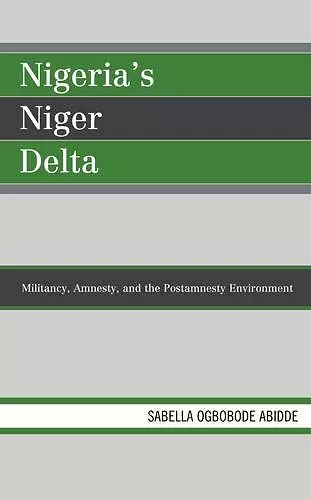Nigeria's Niger Delta
Militancy, Amnesty, and the Postamnesty Environment
Sabella Ogbobode Abidde author
Format:Hardback
Publisher:Bloomsbury Publishing PLC
Published:31st Jan '17
Currently unavailable, and unfortunately no date known when it will be back

The problems and challenges of the Niger Delta predate Nigeria as a Republic. The resultant violence can be traced to 1966, when the late Isaac Boro and his colleagues attempted to secede from Nigeria due, in large part, to the underdevelopment of the region. Historical reality aside, since 1970 oil has displaced agriculture as Nigeria’s primary revenue earner and it has, for the last four decades, been the nation’s breadbasket. But in spite of this, the Niger Delta remains vastly underdeveloped and has been given the least federal presence.
These deficiencies led to high unemployment, social dislocations, youth restiveness, and extralegalities. It was these realities that bred disaffection with the government and the multinational oil companies and eventually, to violent militancy. Between 2003 and 2009, it also led to low intensity conflict between militant youths and the Nigerian government. In the summer of 2009, however, the Nigerian government extended an offer of presidential pardon (amnesty) to the militants. The amnesty program was intended to bring peace and quiet to the region. However, this has not been the case.
In spite of the financial and political resources that have been expended, the region continues on the path of volatility. This book looks at the issue of nationhood, the cause and cost of the crisis, past approaches and current efforts at solving the crisis. In addition, it offers a tenable solution to the decades-old crisis. Furthermore, the case is made that unless there is a fundamental restructuring of the Nigerian state and its governing structure and institutions, the problems of the region—and the larger problems that makes the country such a difficult to place to live in and govern, is likely to continue.
Sabella O. Abidde has written an illuminating and insider account of the history of the Niger Delta as a vital economic region of Nigeria and yet the hotbed of the country and one of the least developed oil-producing areas of the world. Raising critical questions on the adequacy and effectiveness of measures, including amnesty programs, adopted by successive Nigerian governments, oil companies, the European Union and the United States to address the crisis of underdevelopment and insecurity in the Niger Delta, Abidde shades penetrating light on the complex layers of power players and their contributions to the state of affairs in the region. The power relations between the Niger Delta elite—politicians, chiefs and leaders of the ethnonationalist and militia groups—who saw amnesty and other programs as a conduit for self-enrichment and aggrandizement and the masses, particularly, the restive youth, who regarded them as ineffective bottomless welfare system are ably presented. This is a valuable addition to the growing scholarly literature on the politics of oil and resource allocation in Nigeria and Africa. -- Gloria Chuku, University of Maryland, Baltimore County
This very well researched book effectively places the militancy, amnesty, and post-amnesty environment in the Niger Delta within its historical and contemporary contexts while adroitly demonstrating the complexity, national, and international dimensions of the Niger Delta crisis. The interviews with principal personalities involved in the Niger Delta conflict, particularly Henry Okah and Jomo Gbomo, provide fresh and illuminating insights into the dynamics and intricacies of the conflict, and the amnesty and post-amnesty environment. A major and original work that is invaluable for those who want to understand the intricacies of the Niger Delta conflict as well as the strategies for fostering sustainable peace and development in the region. -- Jeremiah Dibua, Morgan State University
Sabella Abidde in Nigeria's Niger Delta, has presented an exposé of the political, social, and economic crises arising from oil exploration and exploitation in Nigeria's economic basket, the Niger Delta. This is an indictment of the Nigerian political elites who, through corrupt practices, have brought the country to her knees and created environmental catastrophe and an economic, social, and political quagmire for millions of Nigerians. This is a magisterial study. -- Onaiwu W. Ogbomo, Western Michigan University
This book incisively traces, examines, and analyzes in an objective and scholarly manner the genesis of the colonial, ethnic, regional, economic, and political factors that eventually contributed to rebellion and the demand for resource control. Unlike any other book in the literature, it sheds light on the management of conflict by analyzing the amnesty program which Nigeria instituted to deescalate armed rebellion in the region. The book fills a void by critically examining the post-amnesty situation that could serve either as a model for conflict resolution or conflict escalation. Indeed, this is a must read book, especially for political and military leaders, policy makers, analysts and those interested in the issues of governance, marginalization and resource control. It is highly recommended. -- Priye S. Torulagha, Florida Memorial University
This book does an excellent job in description, analysis and prescription of possible solutions to the debacle in the Niger Delta. It presents a masterful rendition of continuity and change in Nigeria as germane to the complexities, challenges, contradictions as well as missed opportunities to embrace a politics of positive progress and change by Nigeria’s political elites. It presents the perspectives of major actors, particularly the ethnic militia leaders, and accurately presents the tragic and abysmal condition of the Niger Delta, with the prevalence of poverty, environmental destruction, lack of infrastructure and social services, all consequences of state failure, poor governance and poor institutions. It is a valuable resource for scholars, policymakers, students and others who are interested in Nigerian political economy. -- Mojúbàolú Olufúnké Okome, Brooklyn College, CUNY
ISBN: 9781498542937
Dimensions: 239mm x 156mm x 22mm
Weight: 476g
224 pages